Weather affects our purchase decisions, study shows
1 November 2022

Research from the School of Earth and Environmental Sciences explores whether short-term changes in the physical environment, such as temperature, could help overcome the energy efficiency gap.
The failure of consumers to make seemingly cost-effective investments in energy efficiency is commonly referred to as the energy-efficiency gap.
Addressing the gap would save people money, but it also has broader implications. Energy generation, distribution, and use result in carbon emissions, one of the largest contributors to global climate change. As countries strive to meet international goals for carbon reduction, they must invest in energy efficiency and make it easy to adopt appropriate technologies.
The latest research from Dr Pan He examines the effect of short-run weather fluctuations on air conditioner purchases in the United States.
Large purchase records, from 2006 to 2019, were summarised by the model of the air conditioner and the week of purchase. This data was matched with the ground station climate records to ascertain whether thermal comfort in the week ahead of the purchase would increase the probability of purchasing an Energy Star-certified model.
The findings show that the purchase decision of consumers towards energy efficiency products can be affected by short-run meteorological factors. Consumers are more likely to purchase energy-efficient cooling technologies when the weather is warmer in the week before the transaction. This shift tends to be higher in populations living with higher energy prices and a more moderate climate in the previous years.
One rationale behind these linkages lies in projection bias. Consumers anticipate the future environmental conditions to resemble the current status, even though what they are experiencing is a short-run fluctuation rather than a long-term change.
These findings suggest that policymakers should factor consumer behaviour into their considerations when estimating the loss of climate change. It would also be useful to explore the opportunities for behaviour change as a more easily achieved goal in greenhouse gas mitigation.
The paper titled, ‘The weather affects air conditioner purchases to fill the energy efficiency gap’ is available online in the journal Nature Communications.